


When your baby starts crying, your instinct would probably tell you to go and check on them and see what’s wrong. Most of the time, it could be that they’re hungry but what happens if your baby is crying in their sleep? Could it be a nightmare?
Let’s look at 6 reasons why your baby may be crying while asleep and tips to soothe them back to bed.
All of us, including babies, have a sleep cycle. Unlike adults, babies tend to sleep in short bursts, with each sleep lasting 20-50 minutes long.
Babies also tend to be light sleepers which means that they spend most of their sleeping time in Rapid Eye Movement (REM) sleep or active sleep. This also means they wake up more frequently [1].
While in REM sleep, babies might exhibit the following symptoms:
During the transition from one sleep cycle to the next, babies may wake up briefly and cry out for a few minutes as they adjust to a different sleep stage and fall asleep. This is often seen as a normal part of their sleep development.
So, it may be nothing to worry about if you hear your baby cry while sleeping. However, it’s important to rule out other potential causes, which we’ll explore in the following sections.
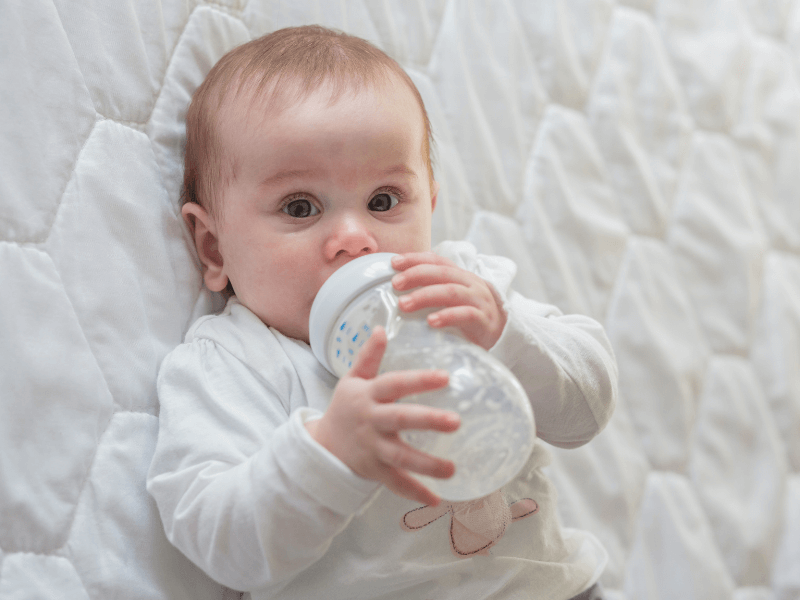
Another possible reason why your baby may cry is due to hunger. Babies may have tiny tummies but they are constantly growing. This means that they would get hungry often, especially throughout the night [2].
Over the first few weeks and months, babies need to be fed every 2 to 4 hours [3]. Whenever babies get hungry, they show a few early signs like putting their hands in their mouth, clenching hands, or puckering their lips [4].
If it’s late at night, you may not be able to look out for these cues. Hence, the only way for your baby to let you know it’s hungry is to cry. Crying is often a late sign of hunger.
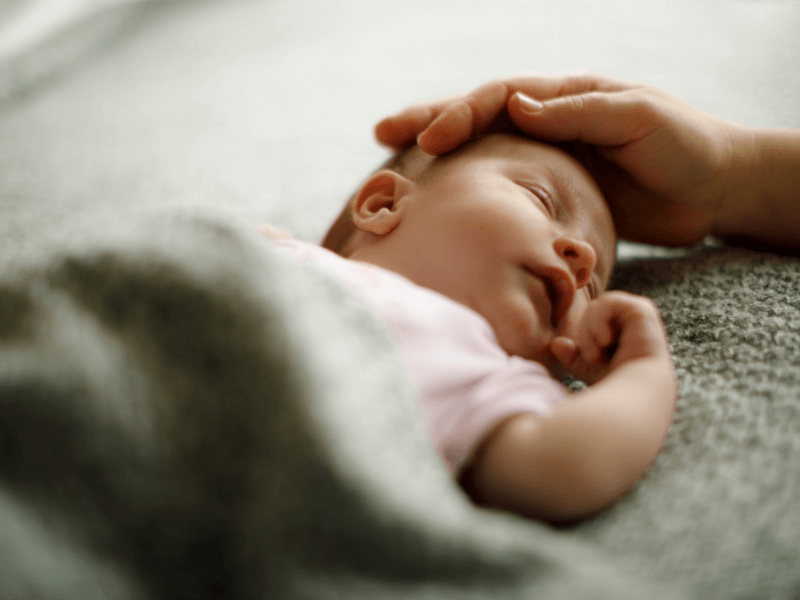
Young babies can easily become overtired, especially in environments with a lot of noise, light, or activity. When this happens, it triggers the production of cortisol and adrenaline in their bodies.
With elevated hormone levels, falling asleep or staying asleep may be harder. This can lead to more frequent waking and crying during sleep [5].
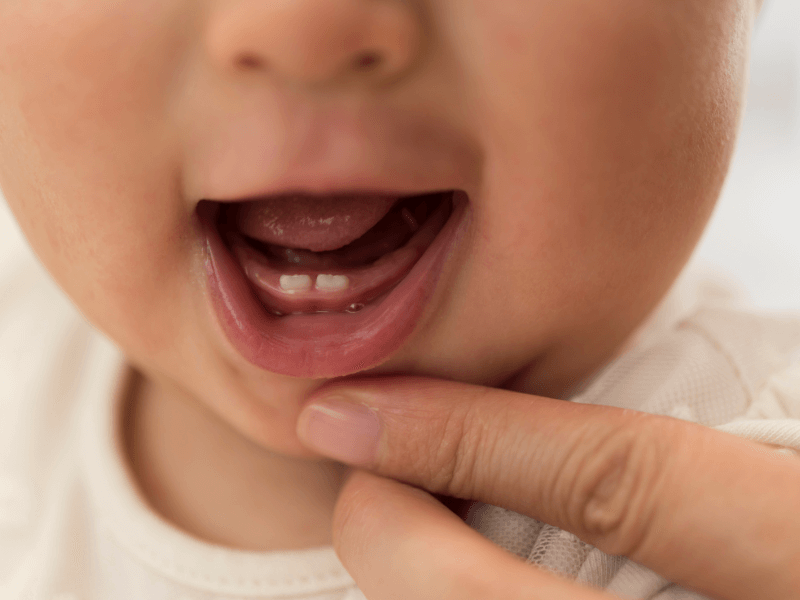
Most babies start to grow their teeth out at around 6 months old. This period may be uncomfortable as their gums become more sensitive.
Sometimes, they may cause no pain or discomfort. In most cases, their gums could swell and feel sore as the unerupted tooth grows [6]. This often leads to nighttime crying as your baby sleeps at night.
It’s your baby’s way of letting you the discomfort that he is feeling. If it happens frequently, you may want to check with a pediatrician for options to relieve the discomfort.
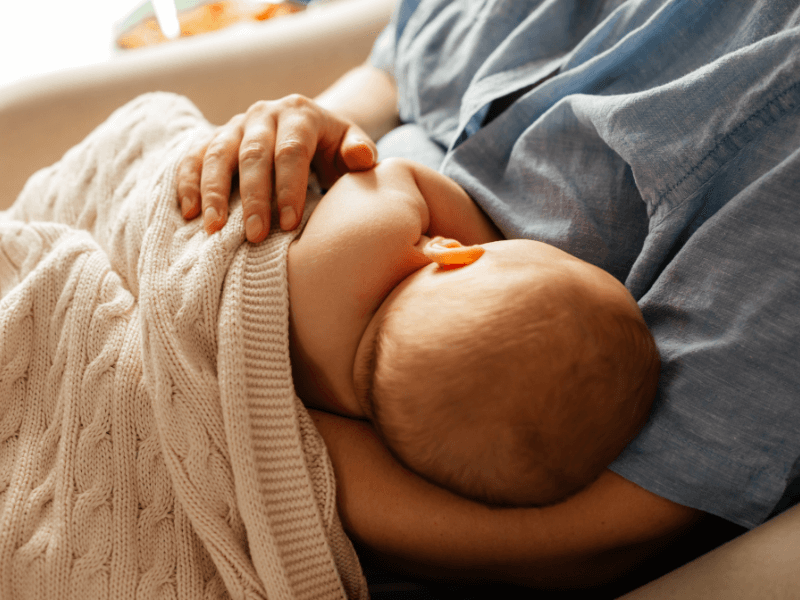
Separation anxiety is also another potential reason why your baby may cry as he sleeps. Separation anxiety in babies may start as early as 4 months old but for most babies, it happens when they are around 8 months old [7].
During these months, your baby starts to develop something called ‘object permanence’. Object permanence is the awareness of an object or person existing even when you can’t see or hear them. This development contributes to separation anxiety [8].
So if you leave your baby in a separate room at night to sleep, it may trigger them to cry as they are unable to sense your presence. If this happens often, consider sleep training. Sleep training is a technique of leaving your baby to learn to fall asleep on his own.
Lastly, we have sleep regression. Sleep regression is a phenomenon that happens when you are unable to sleep well anymore.
The biggest sleep regression that a baby may go through is when he is at 4 months old. Your baby wakes up multiple times, fussing and crying in their sleep.
This sleep regression is caused by your baby adapting to their true circadian rhythm with ‘deep’ and ‘light’ sleep cycles as well as developmental changes. As the body tries to transition between the cycles of sleep, it causes them to wake more often and cry to get back to sleep [9].
Based on these reasons, it’s rather normal for babies to cry in their sleep. It may not always be a cause for concern.
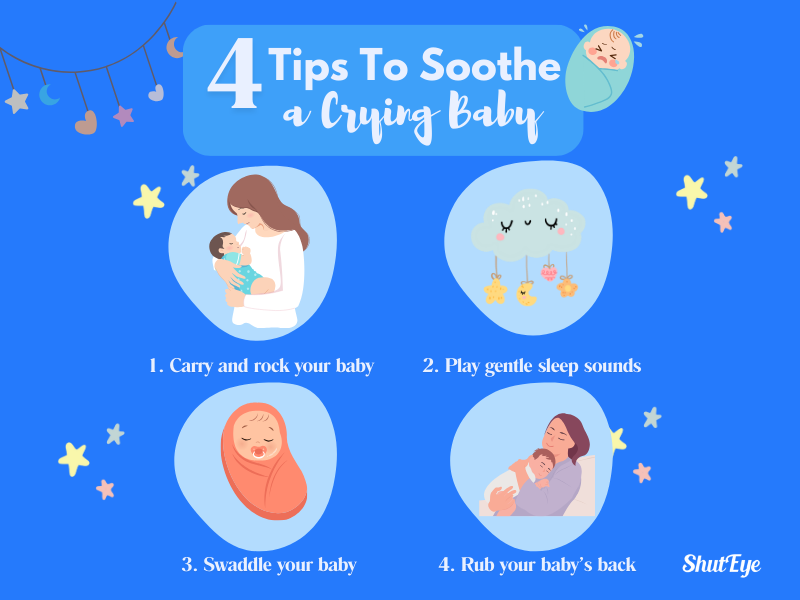
In this case, what should you do when your baby starts crying in their sleep?
Here are 4 tips to help you soothe your crying baby and help them fall back asleep.
You may also like: 10 Best Sleep Tips for Newborns
It’s normal for babies to cry during sleep but if your baby cries for a long time and can’t be pacified, it may be a sign of a medical issue.
If your baby’s cries are associated with these symptoms:
Your baby could be unwell or in pain so you should seek medical advice as soon as possible.
It is a normal behavior for babies to cry in their sleep. By recognizing the common reasons (teething, hunger, transitioning from sleep cycles, separation anxiety, sleep regression, or overtiredness), you can take steps to soothe your baby and help them get a good night’s rest.
Check out our patented sleep tracking app, ShutEye® for more sleep tips and sleep aids that are useful for new parents and those contemplating parenthood.
CDC (2024) Signs Your Child is Hungry or Full [online]. Available at: https://www.cdc.gov/infant-toddler-nutrition/mealtime/signs-your-child-is-hungry-or-full.html?CDC_AAref_Val=https://www.cdc.gov/nutrition/infantandtoddlernutrition/mealtime/signs-your-child-is-hungry-or-full.html
CDC (2022) How Much and How Often to Breastfeed [online]. Available at: https://www.cdc.gov/infant-toddler-nutrition/breastfeeding/how-much-and-how-often.html?CDC_AAref_Val=https://www.cdc.gov/nutrition/infantandtoddlernutrition/breastfeeding/how-much-and-how-often.html
Connecticut Children's (2023) How to Calm a Crying Infant... And Yourself [online]. Available at: https://www.connecticutchildrens.org/growing-healthy/how-calm-crying-infant-and-yourself
Fox, I. (2024) 29 Ways to Soothe a Fussy Newborn [online]. Available at: https://www.parents.com/baby/care/newborn/ways-to-soothe-fussy-newborn/
Lewis, R. (2020) How to Recognize an Overtired Baby [online]. Available at: https://www.healthline.com/health/baby/how-to-recognize-an-overtired-baby
Morgan, K. (2023) Object Permanence: How Do Babies Learn It? [online]. Available at: https://www.webmd.com/baby/what-age-do-babies-have-object-permanence
NHS (2022) Baby teething symptoms [online]. Available at: https://www.nhs.uk/conditions/baby/babys-development/teething/baby-teething-symptoms/
Pampers (2024) All About Separation Anxiety in Babies, Toddlers, and Older Kids [online]. Available at: https://www.pampers.com/en-us/baby/development/article/baby-separation-anxiety
Penn Medicine Lancaster General Health (2022) Understanding and Navigating Sleep Regressions [online]. Available at: https://www.lancastergeneralhealth.org/health-hub-home/motherhood/the-first-year/understanding-and-navigating-sleep-regressions
Pregnancy Birth and Baby (2023) aby sleep patterns by age [online]. Available at: https://www.pregnancybirthbaby.org.au/sleep-patterns-for-babies